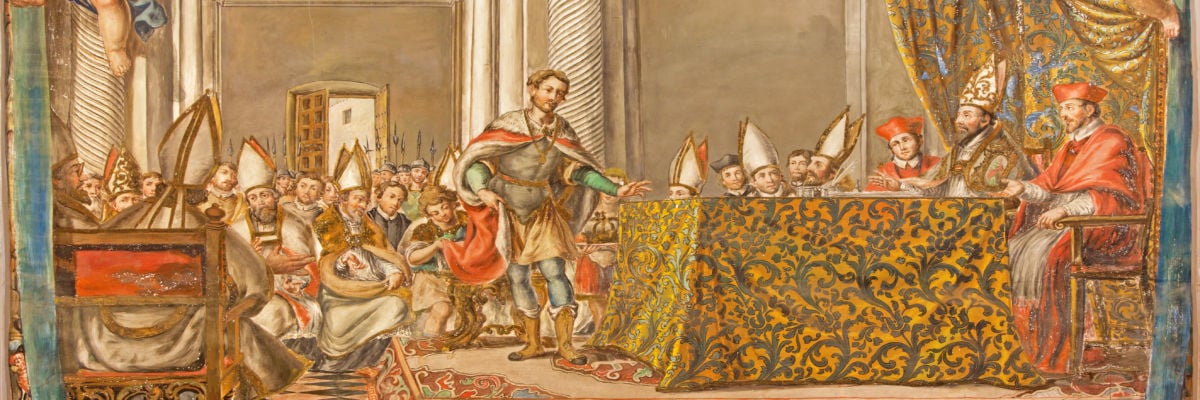
Sola scriptura Protestants often assert that although they believe that Scripture is the only infallible authority, there are other authorities, such as tradition and councils, that should be taken seriously. Arguing that Scripture is the only final authority does not mean that there cannot be other, less authoritative authorities, they may say.
Protestant apologist Matt Slick made this argument in a recent discussion. In this video, he defined sola scriptura in this way: “The scriptures are the final authority. It doesn’t mean we don’t look at tradition or councils. It means that it’s the final authority.”
As another example, it’s often asserted by Protestants like James White and Jeff Durbin that sola scriptura is not “me and my Bible under a tree,” meaning that sola scriptura Protestants do not ignore the early Church in their arguments, but also recognize that they are not infallible.
This belief may seem reasonable on the surface, but it is not even close to what happens. Protestants like White, Durbin, and Slick will often try to persuade their audience into believing that they care about the early Church councils when they really do not. Or at the very least, they care about them only when they agree with their interpretation of Scripture. Once we recognize this, it only makes sense to conclude that these Protestants really do not care about what these councils teach.
A specific example should make this clear. Protestants will often use what Nicaea I says about the divinity of Christ as a supplemental argument to their predetermined notion as to what Scripture says. They will argue that although these men were not infallible, their decision was authoritative, and we should follow it.
This seems fine, except when we recognize that the council’s canons also assume a trifecta of Church offices (bishop, priest, and deacon), which is not something these men would believe in. Here is canon 15 from the council:
On account of the great disturbance and discords that occur, it is decreed that the custom prevailing in certain places contrary to the canon, must wholly be done away; so that neither bishop, presbyter, nor deacon shall pass from city to city. And if any one, after this decree of the holy and great Synod, shall attempt any such thing, or continue in any such course, his proceedings shall be utterly void, and he shall be restored to the Church for which he was ordained bishop or presbyter.
What is the justification for accepting one part of the council but rejecting another part? It seems to go back to whatever they believe Scripture says. White would likely reject what the council teaches there because he does not believe that the priesthood is something that existed in the New Testament. So these Protestants do not actually care about what the councils say, and they agree with them only in the sense that they agree with their interpretation of Scripture. Because of this, it makes little sense to argue for something because a council said so when they agree with only that part of the council that agrees with their interpretation of Scripture. In that case, why even bring up the council? Why not just argue with Scripture?
Matt Slick essentially admitted in a recent video that he does not care about the early Church, despite attempting to argue in an earlier debate that sola scriptura is not anti-tradition. In this video, Slick said this:
I care about the scriptures. I talk to Catholics—they always want to quote Augustine, they want to quote somebody here. I don’t care. I don’t care about the Church Fathers. I want to see what Scripture says.
Which is it? Can we look at councils as a standard (even if they are fallible) or not?
Some Protestants may object here and argue that there is no inconsistency since they believe that councils are not infallible. Therefore, they can pick and choose different things in them to take seriously. However, this is not the case. Even if a council can be wrong, I still need to provide consistent reasons to accept or reject certain parts of the council. I can’t just arbitrarily dismiss certain teachings without a real consistent reason.
A specific example should make this clear. For example, say someone said, “I believe in the Big Bang Theory because this science book says it.” However, what if that science book also says dinosaurs are walking the streets of Manhattan today? Why can he appeal to that book for one thing but reject it for another? There has to be a consistent, logical reason to accept one thing and reject the other thing.
This arbitrary dismissal of certain things councils teach is known as special pleading—a logical fallacy in which someone applies a principle or rule to others but exempts himself (or his position) without providing a valid reason for the exception. By being inconsistent and appealing to councils and also rejecting certain parts of them, Protestants are committing this fallacy.
All in all, by saying they care about councils while ignoring or dismissing parts of councils contradict their interpretation of Scripture, Protestants are trying to have their cake and eat it, too. To beat the accusation of special pleading, they’d have to present a consistent set of standards for determining which parts of councils to take seriously. However, if the Protestant wants to argue that he takes councils seriously only when they line up with his interpretation of Scripture, we return to the original critique, which is that Protestants really do not care about the councils. They care about only what they believe Scripture says, no matter how much they want you to believe that sola scriptura is not anti-history.
This is not the only bad logic you’ll find in the apologetics wars. To see more examples—which you likely hear every day and don’t even know it—read Parker’s new book, The Protestant Fallacies.



